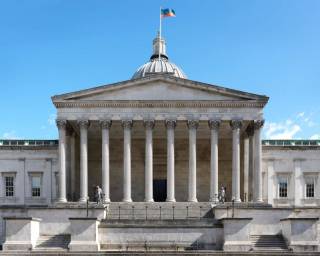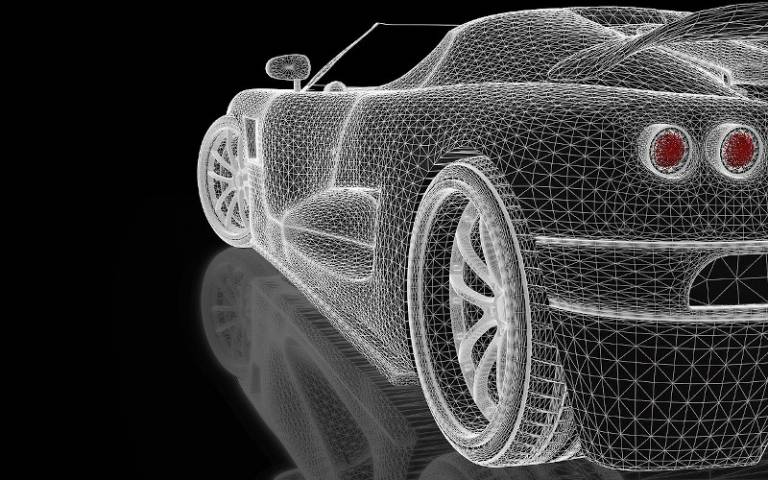With new and emerging technologies, it is vital that public policy is evidence-based to ensure that it is robust, fit for purpose, and benefits communities as well as industry. Through academic engagement with policy, we can help to ensure that new law and policy will be effective and enable responsible use of technology.
AI research can make a difference through knowledge-sharing with policy professionals, questioning doctrine and bringing solutions to the biggest challenges our society faces today. This is well aligned to our philosophy that research should deliver public benefits and disrupt thinking in a positive way.
AI policy engagement at UCL
AI policy engagement at UCL does not sit within one discipline or department, but uniquely cuts across our teaching, research and student engagement. The breadth of our academic expertise and our proximity to decision makers positions us to respond to the challenges and opportunities presented by AI.
In addition to aligning with the UK Government’s Industrial Strategy Grand Challenge on Artificial Intelligence and Data, our work also includes significant AI policy engagement in fields such as privacy, competition, economic development, education and work.
Furthermore, the 2019 UCL Research Strategy highlights our ambitions to cross research boundaries, increase engagement and deliver impact for public benefit, and we will continue to utilise our research strength to harness the power of AI to better society.
Developing solutions to global problems
Extending beyond the UK, our policy engagements also play a major part in developing solutions to global problems. The UN Sustainable Development Goals (SDGs) are the blueprint to achieving a better and more sustainable future for all, and address a wide range of global challenges, including those related to poverty, inequality, climate change, environmental degradation, peace and justice.
Supporting the SDGs, our research capabilities in AI are driving conversations capable of solving complex, dynamic, and interconnected global challenges.UCL Institute of Education academic Professor Rose Luckin, for example is contributing her expertise on AI and education through the UNESCO run SDG Education 2030 Steering Committee.
Case studies
The breadth of our academic expertise and our proximity to decision-makers positions us to respond to the challenges and opportunities presented by AI.
Below is a selection of case studies showcasing our policy engagement activities relating to the future of AI within a range of sectors:
Transport
As the Government aims to make the UK a leading country for connected and automated vehicles (AVs), UCL is considering the implications of this technology.
Dr Jack Stilgoe, a Science and Technology scholar and leading expert in automated vehicles, is encouraging better public debate about the uncertainties and possibilities of self-driving vehicles on the behalf of the Government. His work aims at putting greater nuance into the policy debate by showing that it is not just a question of technology. His research also questions public attitudes towards this new mode of transportation, and why policy responses matter.
Public services
UCL is at the forefront of thinking about the impact and potential of the digital revolution in the government sector, from data driven policies to public services using AI technologies.
Dr Zeynep Engin, Senior Research Associate at the UCL Urban Dynamics Laboratory, is leading initiatives that aim to bring AI into policy making processes and support the adoption of AI technologies by policy professionals. The focus of this work is on digital infrastructure and methodology development to collect and analyse policy-relevant data to provide a better evidence base for policy-makers.
Schools
AI technologies are significantly changing the landscape of teaching and learning. UCL researchers are taking a lead, devising new tools and informing policy professionals and educational stakeholders about the benefits of the digital revolution for the education sector.
Professor Rose Luckin is working on preparing the education community for the age of artificial intelligence; through her research and engagement activities with the Government, she aims to shape the debate on the schools of the future.
The economy
As governments compete internationally to better transition to the fourth industrial revolution, UCL is providing guidance on how to maximise its benefits.
Founder of the UCL Institute for Innovation and Public Purpose, Professor Mariana Mazzucato's research seeks to change the way the Government reflects about its role in delivering change, and how innovation can be directed to solve the pressing global challenges of our time. She supported the UK Government in adopting a mission-oriented framework for its Industrial Strategy, in which positioning the UK at the forefront of the AI and data economy is one of four Grand Challenges.
Governance
The impact of AI crosses borders, stressing the need for renewed forms of international governance of data and innovation. UCL analyses how international relations will impact the spread of these new ideas and technologies.
Oliver Patel, researcher at the UCL European Institute, has a particular interest in how risks to international relations, such as Brexit, affect the regulation of AI and data. His research demonstrates that the EU provides a gold standard in data protection that the UK has no interest in diverging from. To continue to derive benefits from the globalisation of the economy, a coordination of the Member States' responses to the challenges and opportunities raised by the fourth industrial revolution is required.
Health
AI is transforming all aspects of healthcare diagnoses, treatment and health and care delivery to be more efficient and cost effective. UCL's community of experts help policy-professionals to anticipate and support those changes.
 Close
Close









